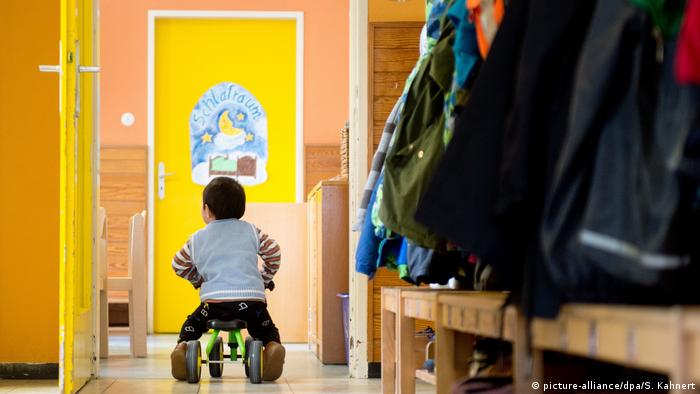The German government has provided states with billions of euros in subsidies for daycare centers. Despite this massive investment, one in seven toddlers won't get a spot in a publicly funded day care.

Even before a child is born in Germany, its parents are beginning their search for a day care. A new study has shown that finding a spot is getting even harder.
Germany currently has a shortage of 342,300 spots in publicly subsidized daycare centers for children under 3 years of age. That is according to a study by the German Economic Institute (IW), a private research institute in Cologne, the results of which were published in the Sunday edition of the Welt am Sonntag newspaper.
That shortage means that about one in seven toddlers, or 14.4%, will not get a spot at a publicly funded day care. Five years ago, this was the case for 10.2%, according to the IW.
Read more: 3 in 4 German daycare children not getting proper care: study
Worse in the west
The shortage is greater in western Germany, particularly Saarland, Bremen and North-Rhine Westphalia. In those three states, about one in five children are without a day care spot.
North-Rhine Westphalia, Germany's most populous state, has the largest so-called care gap at 98,100 spots, according to IW. The Ruhr region, the largest urban area in Germany, has a particularly large demand for day care spots, the IW study found.
By contrast, day care spots is less of an issue in the five German states that made up the former East Germany. Brandenburg, Mecklenburg-Vorpommern, Saxony, Saxony-Anhalt, and Thuringia all have a care gap of less than 7%.
Why is there a shortage?
Since 2013, all children in Germany have had a legal entitlement to a place in a daycare center or in day care. The government also passed a bill in 2019 that would provide €5.5 billion ($6.51 bullion) in government subsidies by 2022 to Germany's 16 German states for daycare facilities.
But the public day care system has struggled to keep pace. According to Germany's Ministry for Family Affairs, this is because the needs of parents have changed.
"More and more parents want a place for their child at an earlier age," a spokeswoman for the ministry told Welt am Sonntag.
Read more: German minister pushes for kindergarten language testing
In 2019, 49.4% of parents wanted to send their small children to day care, a ministry survey found. This corresponds to 1.17 million day care spots for toddlers, according to the IW. But only 829,200 toddlers eligible for day care got a spot.
The shortage in spots has forced many mothers to stay home longer to look after their little ones. Wido Geis-Thöne, one of the authors of the IW study, said this shortage also has an effect on the German economy.
"Women are, to a very large extent, skilled workers who companies urgently need," Geis-Thöne told Welt am Sonntag. "When the large birth cohorts leave the labor market in the next few years, the problem will intensify."
Since 2013, all children in Germany have had a legal entitlement to a place in a daycare center or in day care. The government also passed a bill in 2019 that would provide €5.5 billion ($6.51 bullion) in government subsidies by 2022 to Germany's 16 German states for daycare facilities.
But the public day care system has struggled to keep pace. According to Germany's Ministry for Family Affairs, this is because the needs of parents have changed.
"More and more parents want a place for their child at an earlier age," a spokeswoman for the ministry told Welt am Sonntag.
Read more: German minister pushes for kindergarten language testing
In 2019, 49.4% of parents wanted to send their small children to day care, a ministry survey found. This corresponds to 1.17 million day care spots for toddlers, according to the IW. But only 829,200 toddlers eligible for day care got a spot.
The shortage in spots has forced many mothers to stay home longer to look after their little ones. Wido Geis-Thöne, one of the authors of the IW study, said this shortage also has an effect on the German economy.
"Women are, to a very large extent, skilled workers who companies urgently need," Geis-Thöne told Welt am Sonntag. "When the large birth cohorts leave the labor market in the next few years, the problem will intensify."
No comments:
Post a Comment